Foreign relations of Turkey
 |
| This article is part of a series on the politics and government of Turkey |
|
See also
|
Foreign relations of the Republic of Turkey are the Turkish government's policies in its external relations with the international community. Historically, based on the Western-inspired reforms of Mustafa Kemal Atatürk, such policies have placed heavy emphasis on Turkey's relationship with the Western world, especially in relation to the United States, the North Atlantic Treaty Organization and the European Union. The post-Cold War period has seen a diversification of relations, with Turkey seeking to strengthen its regional presence in the Balkans, the Middle East and the Caucasus, as well as its historical goal of EU membership. Under the AKP government, Turkey's influence has grown in the Middle East based on the strategic depth doctrine, also called Neo-Ottomanism.[1][2] Debate on Turkey in the West is sharply divided between those who see Turkey moving away from the West toward a more Middle Eastern and Islamic orientation and those who see Ankara's improved ties with its Islamic neighbors as a natural progression toward balance and diversification.[3]
Europe
 European Union
European Union

The Turkish application to join the European Economic Community (now the European Union) as an associate member in 1959 soon resulted in associate membership in 1963, with full membership being acknowledged as the final goal. However, problems in foreign policy such as the Cyprus conflict and the internal political turbulence from the 1970s until the early 1980s forced Turkey to delay applying for full membership of the European Community until 1987. The application was rejected, although the E.C. did say that Turkish membership could occur at some point in the future.
An EU-Turkey Customs Union came into effect on 1 January 1996, allowing goods to travel between Turkey and the EU member states without customs restrictions, although it crucially stopped short of lifting restrictions in areas such as agriculture.
The European Union confirmed Turkey's status as candidate for membership at the European Council's Helsinki Summit in 1999. The accession talks did not follow immediately, however, as the EU said Turkey had to make significant reforms, particularly in the field of human rights, before the talks could begin. Turkey's current administration has identified EU membership as its top priority, and has taken many – and sometimes controversial – reform packages through the Parliament aimed at gradually harmonizing Turkey with EU standards. Since October 2005, Turkey has formally started accession negotiations with the EU and these will be based on the acquis communautaire. The EU accession bid has stimulated Turkey's political and legal reforms and intensified the democratization process.[4]
| Country | Formal Relations Began | Notes |
|---|---|---|
| See Austrian–Turkish relations
From the middle ages until the twentieth century today's Austria and Turkey were the core regions within much larger empires. Austria was the seat of the House of Habsburg and Turkey was ruled by the House of Osman (also known as the Ottoman Dynasty). The Habsburg and Ottoman states were both large multi-ethnic conglomerations sustained by conquest. These rival empires waged frequent wars against each other over control of much Central Europe and the Balkans. | ||
| 1992-05-25 | See Belarusian–Turkish relations
| |
| See Belgian–Turkish relations | ||
| 14 October 1756[8] | See Denmark–Turkey relations
| |
| 1920-05-20 | See Finnish–Turkish relations
| |
| See French–Turkish relations
Turkey has an embassy in Paris and consulates general in Lyon, Marseille and Strasbourg. France has an embassy in Ankara, and a consulate general in Istanbul. | ||
| See German–Turkish relations
Based on good Turkish-German relations from the 19th century onwards, Germany promoted a Turkish immigration to Germany. However, large scale didn't occur until the 20th century. Germany suffered an acute labor shortage after World War II and, in 1961, the Federal Republic of Germany (West Germany) officially invited Turkish workers to Germany to fill in this void, particularly to work in the factories that helped fuel Germany's economic miracle. The German authorities named these people Gastarbeiter (German for guest workers). Most Turks in Germany trace their ancestry to Central and Eastern Anatolia. Today, Turks are Germany's largest ethnic minority and form most of Germany's Muslim minority. | ||
| 1868 | See Holy See – Turkey relations
| |
See Hungarian–Turkish relations
| ||
See Ireland – Turkey relations
| ||
| 1856 | See Italian–Turkish relations
| |
See Maltese–Turkish relations
| ||
See Polish–Turkish relations
| ||
| See Portuguese–Turkish relations
Turkey's 161 years of political relations with Portugal date back to the Ottoman period when Viscount de Seixal was appointed as an envoy to Istanbul. Diplomatic relations ceased during World War I and were re-established in the Republican period in 1926. A resident embassy was established in 1957. Portugal has an embassy in Ankara.[17] Turkey has an embassy in Lisbon. Both countries are full members of NATO. | ||
| See Spanish–Turkish relations
Spain has an embassy in Ankara. Turkey has an embassy in Madrid.[18] | ||
See Swedish–Turkish relations
| ||
| 1793 | See Turkey – United Kingdom relations
Both countries currently maintain relations via the British Embassy in Ankara[24] and the Turkish Embassy in London.[25] Turkey and the United Kingdom maintain strong bilateral relations.[26] The President of Turkey Cevdet Sunay paid a state visit to the United Kingdom in November 1967.[27] The President of Turkey Kenan Evren paid a state visit to the United Kingdom in July 1988.[27] HM Queen Elizabeth II of the United Kingdom paid state visits to Turkey in October 1971, and in May 2008.[28] Britain and Turkey are both members of the G20, and Britain supports the accession of Turkey to the European Union. |
 Greece
Greece
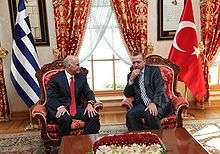
Aegean disputes constitute one of the main reasons for the fluctuating course of Turkish-Greek relations. There is a series of interconnected problems between Turkey and Greece, all emanating from the Aegean Sea. The length of territorial waters, demarcation of the continental shelf, determination of maritime search and rescue zones, air space disputes, militarization of the Eastern Aegean Islands in breach of international agreements, the status of certain Aegean islets which, Turkey claims, were not ceded to Greece by international agreements and the absence of an agreement defining maritime borders with Greece in the Aegean are the major disputes between the two countries. These disputes remain unresolved mainly because of a lack of common understanding between the two sides regarding the "existence" and "methods of solution" of the problems. Rejecting the existence of other disputes, Greece notes that the only dispute in the Aegean is the continental shelf issue and claims that it can only be resolved by jurisprudence.
Turkey's stated view is that the Aegean Sea is a common sea and that no sovereignty rights should be claimed over the open seas and international airspaces in the Aegean Sea.
Since August 1999, Turkey and Greece have conducted a series of "Confidence Building Measures" to improve relations concerning these matters.

On Monday 23 December 2011, in an interview on Turkish newspaper BirGün discussing secret budgets, former Turkish Prime Minister Mesut Yılmaz allegedly admitted that Turkish secret agents intentionally started forest fires in Greece between 1995 and 1997 during the Prime Ministership of Tansu Çiller as retaliation of forest fires in western Turkey in 1995 started by Greek agents, resulting in huge damage caused by major forest fires on the islands of the eastern Aegean and in Macedonia. Mesut Yılmaz's admission sparked political outrage in Greece, causing Greece's Foreign Ministry spokesman Grigoris Delavekouras to say that the claims were "serious and must be investigated", adding that Athens was awaiting a briefing from Ankara. Conservative New Democracy's shadow foreign minister Panos Panayiotopoulos said the revelations “cast heavy shadows over Greek-Turkish relations” and called on Turkey recompense Greece for losses incurred.[29][30] Following an official complaint from Greece on 24 December seeking clarification over comments by former Prime Minister Mesut Yilmaz relating to forest fires in Greece in the mid-1990s, the Greek and Turkish foreign ministers, Stavros Dimas and Ahmet Davutoğlu, spoke on Wednesday 28 December. Dimas stressed how important it was that Ankara investigate the claims that in the past Turkey's intelligence services paid arsonists to set fire to forests in Greece. In addition to Greek Foreign Ministry meetings with Turkish officials, Greece’s Supreme Court prosecutor Yiannis Tentes launched an emergency inquiry on 27 December, ordering the investigations into the mid-1990s wildfires blamed on arson to be reopened with regard to the initial claims reportedly made by Yılmaz.[31] Former head of Greek intelligence service Leonidas Vasilikopoulos said they had received information from their agents in Turkey that Turkish agents or others were involved in the forest fires on Greek islands.[32] After making the comments in Turkish daily newspaper BirGün, Yılmaz said that his words had been distorted and that he was referring to Greek agents causing fires in Turkey.[33] However, on Thursday 29, Turkish daily Milliyet published an article referring to a secret report that seemed to support claims made in the interview by Mesut Yilmaz that secret agents had caused forest fires in Greece in the 1990s. According to Milliyet, an associate of Yılmaz's, Kutlu Savas, compiled a 12-page report that detailed the actions of Turkish agents in Greece. It described how the National Intelligence Organization of Turkey (MIT) had formed two teams: one which carried out bombings at tourist sites on Crete and other parts of Greece and another which was responsible for starting the wildfires. An attack on an army camp in Lamia, central Greece, is also mentioned.[34]
Balkan states
Turkey has close historical, cultural, economic and political ties with some of the Balkan states, which are important for Turkey as they are the country's gateway to continental Europe. Turkey attaches importance to the creation of an atmosphere of mutual understanding and peaceful co-habitation through closer ties with the Balkan countries, which would lead to the preservation of peace and stability in the region. Turkey has participated in NATO operations and peacekeeping missions, contributing to the KFOR and the UN police mission in Kosovo (UNMIK), as well as the EU-led police mission “Proxima” in the Republic of Macedonia. Turkey is also contributing to the EUFOR-ALTHEA. For the reconstruction efforts Turkey is part of launching the South-East European Cooperation Process (SEECP), and the Multinational Peace Force Southeast Europe (MPFSEE)/Southeastern Europe Brigade (SEEBRIG). Turkey also plays a role in regional economic initiatives as well as the Stability Pact for Southeastern Europe initiated by the EU and the Southeast European Cooperative Initiative (SECI).
| Country | Formal Relations Began | Notes |
|---|---|---|
| See Albanian–Turkish relations | ||
See Bulgarian–Turkish relations
| ||
| See Bosnia and Herzegovina–Turkey relations | ||
| See Greco-Turkish relations, Aegean dispute
Turkey and Greece have clashed for decades over the status of Aegean islands and over the extent of territorial waters and airspace. The tensions came to the brink of war on a number of occasions, most recently in 1996, when Greek and Turkish warships faced each other close to the disputed Imia-Kardak rocks. Only U.S. and NATO intervention subsided the conflict. In February 1999, relations between Greek officials and Abdullah Öcalan (holding a Greek Cypriot passport) and the role of the Greek Embassy in Nairobi, Kenya, where Öcalan was captured by agents of the Turkish National Intelligence Organization (MİT) caused crisis in relations between the two countries for a period of time; but relations have since improved, particularly following the earthquakes that struck both countries in 1999. However, the Imia/Kardak issue sprang up again on a smaller scale in 2004. | ||
| See Kosovan–Turkish relations
On 17 February 2008, Turkey became one of the first countries to announce officially about recognition of sovereign Kosovo. Turkey turned its coordination office in Pristina into an embassy after a cabinet decision to open a mission in Kosovo. The decision comes in accordance with the reciprocity principle common in diplomatic relations, when Kosovo announced that it was planning to open one of its first foreign missions in Ankara.[37] The population of Kosovars living in Turkey is said to be much more than those living in Kosovo.[38] Kosovo is the home country of Mehmet Akif Ersoy, writer of the Turkish National Anthem, and many others. There are 20,000 Turks living in Kosovo.[39] Also Turkish is one of the official regional languages of Kosovo. | ||
| See Macedonian–Turkish relations
Due to historical and cultural mutualities and human bonds, Macedonia and Turkey have very close and friendly relations. Macedonia has an embassy in Ankara and a consulate–general in Istanbul, while Turkey has an embassy in Skopje and a consulate-general in Bitola. | ||
See Moldovan–Turkish relations
| ||
See Romanian–Turkish relations
| ||
| See Serbian–Turkish relations
Turkish Defense Minister Vecdi Gönül and Serbian Defense Minister Dragan Šutanovac met in Ankara on 12 May 2009 to sign a defence cooperation agreement. Gönül stated that, “Although we do not have a common border, we see Serbia as a neighbour,” and, “Turkey desires to maintain and improve its relations with Serbia the most, among all the other Balkan states.” Šutanovac confirmed that, “There are a lot of things to do in this field,”[41] and, “We are thinking of taking some initiatives in the defense industry together, like co-production in Turkey or Serbia.”[42] |
 Russia
Russia
Following immediately after the dissolution of the Soviet Union, relations between the two nations dramatically and strongly improved; although disagreements regarding the border dispute over the Caucasus and support of each other's lifelong historical adversaries both linger. Russia is somewhat skeptical of Turkey's admission into the European Union and has recognized the Armenian Genocide which has the potential of damaging its relations with Turkey, but both countries are key strategic partners in the Transcaucasian region.
Turkish Prime Minister Erdoğan flew to Sochi, Russia, for a 16 May 2009 “working visit” with Russian Prime Minister Vladimir Putin at which he stated, “Turkey and Russia have responsibilities in the region. We have to take steps for the peace and well being of the region. This includes the Nagorno-Karabakh problem, the Middle East dispute, the Cyprus problem.” Putin responded that, “Russia and Turkey seek for such problems to be resolved and will facilitate this in every way,” but, “As for difficult problems from the past – and the Karabakh problem is among such issues – a compromise should be found by the participants in the conflict. Other states which help reach a compromise in this aspect can play a role of mediators and guarantors to implement the signed agreements.” Whilst on the subject of energy security Erdoğan stated that, “The agreement on gas supplies through the so-called Western route signed in 1986 is expiring in 2012. We have agreed today to immediately start work to prolong this agreement.”[43][44] Putin made a reciprocal visit to Turkey in June.[45]
In November 2015, Turkey shot down a Russian Sukhoi Su-24 aircraft, due to an alleged violation of its airspace, and since then relations have deteriorated significantly. During a Russian military briefing in December, officials from the Russian Defense Ministry accused Turkey of purchasing and smuggling in oil from ISIL in Syria. The officials provided alleged videos and photos of the smuggling as evidence.[46][47][48] The claims were quickly dismissed by much of the international community after analysts revealed that the supposed smuggling routes were not under ISIL control.[49] Russia later accused Turkey of deploying troops in Iraq without the permission of Iraqi government authorities.[50]
 Ukraine
Ukraine
Turkey and Ukraine have a long chronology of historical, geographic, and cultural contact. Diplomatic relations between both countries were established in the early 1990s when Turkey became one of the first states in the world to announce officially about recognition of sovereign Ukraine.[51] Turkey has an embassy in Kiev and a consulate general in Odessa.[52] Ukraine has an embassy in Ankara and a consulate general in Istanbul.[53] Turkey is a full member of NATO and Ukraine is a candidate. Also both countries are BLACKSEAFOR and BSEC members.
South Caucasus
The former Soviet republics in the South Caucasus (Armenia, Azerbaijan, and Georgia) are important for Turkey politically, economically, socially and culturally. The government develops policies in this region taking into account its strategic importance, due to its energy resources and pipeline corridors, and collaborates with its South Caucus neighbours in the BSEC, the Organization for Security and Co-operation in Europe and the Council of Europe.
 Armenia
Armenia
Armenia-Turkey relations have long been strained by a number of historical-political issues including Turkish dispute of the Armenian Genocide during World War I. Also contributing to the tensions have been terrorist attacks on Turkish citizens and diplomats by the Armenian militant groups Armenian Secret Army for the Liberation of Armenia (ASALA) and Justice Commandos of the Armenian Genocide (JCAG) in the 1970s and 1980s. Turkey's indirect support for Azerbaijan in the Nagorno Karabakh War, as well as in potential border disputes between Azerbaijan and Armenia, was an issue in the 1990s. Currently, there are currently no formal diplomatic relations between the two modern states.
Turkey recognised the state of Armenia soon after its 1991 independence, but formal diplomatic relations were not established. Issues came to a head in 1993 when Turkey sided with its fellow Turkic ally Azerbaijan over the Nagarno-Karabakh War by closing its borders with Armenia and were exacerbated by subsequent pipeline and infrastructure projects that bypassed Armenia, and Armenia’s controversial decision to re-commission the outdated Metsamor Nuclear Power Plant just 16 km from Turkey’s border.
In the wake of the 2007 murder of Turkish Armenian intellectual Hrant Dink by a Turkish gunman, and the ensuing scandal in which his killer was pictured while holding up a Turkish flag, flanked by smiling government employees,[54] tens of thousands of Turkish citizens marched throughout the country in protest in support of Dink. The subsequent diplomatic thaw saw Turkish President Abdullah Gül become the first ever Turkish leader to visit Armenia[55] and the announcement of a provisional roadmap for normalising diplomatic ties.[56] It was announced that Turkey and Armenia agreed to establish diplomatic relations on 10 October 2009.[57] However, those diplomatic efforts to normalise the relations have faltered. Armenia suspended the ratification process, citing preconditions set forth by Turkey.[58]
 Azerbaijan
Azerbaijan
See Azerbaijan–Turkey relations
Azerbaijan-Turkey relations have always been strong with the two often being described as "one nation with two states" due to a common culture, history, ethnicity, and the mutual intelligibility of Turkish and Azerbaijani. Turkey has been a staunch supporter of Azerbaijan in its efforts to consolidate its independence, preserve its territorial integrity and realize its economic potential arising from the rich natural resources of the Caspian Sea.
Today, the relationship with Azerbaijan represents the "most important bilateral partnership" in current Turkish foreign policy while Azerbaijan foreign policy affirms its relationship with Turkey as one of its most enduring bilateral relationships, as evidenced in aligned political affairs, mutual cooperation in the areas of trade, commerce, finance, technology, diaspora, academics, as well as the arts and sciences; the sharing of government and military intelligence, and joint combat operations and peacekeeping missions carried out between Azerbaijani Armed Forces and Turkish Armed Forces.[59][60]
 Georgia
Georgia
See Georgian–Turkish relations
Turkey has a close partnership relations with Georgia. Turkish citizens can use the Batumi Airport in Georgia, which is run by Turkey's Tepe-Akfen-Vie consortium (TAV), without a visa or passport. Turkey views the Abkhazian and South Ossetian conflicts as a potential danger to peace and stability in the entire region. The resolution of these problems is essential for the preservation of peace and stability in the area. Turkey has shown a readiness to be a negotiator for the Abkhazian conflict.
Middle East
Mustafa Kemal Atatürk created a radical shift in Turkish domestic and foreign policy by instituting a strong tradition of secular democracy, which had its roots in the West. Atatürk was an admirer of Enlightenment in many ways and made numerous reforms to modernize Turkey, based on the principles of positivist and rationalist Enlightenment, which he believed would foster educational and scientific progress. In this period, Turkey shifted increasingly towards the West, while culturally and ideologically distancing itself from the conservative mindset, practices and traditions of the Middle East, which were regarded by the Turkish revolutionaries as the source of the backwardness that had caused the Ottoman Empire to collapse. Although Mustafa Kemal Atatürk established a secular, modern country he never formed alliances with Western countries, rather he strengthen relationship with Middle Eastern and Asian countries by forming Treaty of Saadabad, The Baghdad Pact, also forming regional alliance, Balkan Pact.
In The New Turkey (Granta Books, 2005) BBC correspondent Chris Morris claims that “Turkey’s secular democracy, its application for EU membership and its close relationship with the United States have long been regarded in Tehran, Baghdad and Damascus with intense suspicion. Islamists look at the secular state which buried the caliphate and think ‘betrayal’; and Arab nationalists still haven’t forgotten that Turks are their former colonial rulers.” “But there’s been a thaw, especially since the AKP came to power,” and “the new Turkish model – trying to mix greater democracy and Islam together – is now the subject of curiosity and not a little envy.”[61]
 Bahrain
Bahrain
See Foreign relations of Bahrain
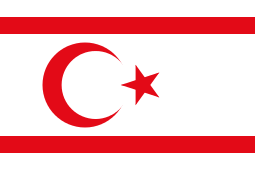 Turkish Republic of Northern Cyprus
Turkish Republic of Northern Cyprus
The Republic of Cyprus was established by the 1959–60 Agreements between Greece, Turkey and the United Kingdom as a partnership state between Greek and Turkish Cypriots. In 1963 violence erupted on the island following attempts to amend constitutional safeguards for Turkish Cypriots, leading to a separation of the two communities. A UN Peace-keeping Force (UNFICYP) was dispatched to the island in March 1964.
On 15 July 1974, the military Junta then ruling Greece staged a coup d'état in Cyprus which was aimed at materializing Enosis—Union with Greece—through an armed takeover of the island. This led to Turkey’s military intervention under the Treaty of Guarantee. The international community, including the Republic of Cyprus considers it as an illegal invasion.
Turkish Cypriot leader, Rauf Denktas and Greek Cypriot leader Glafcos Clerides reached an agreement in Vienna on 2 August 1975 for the "exchange of populations" under the auspices of the UN and this agreement was implemented by the mediation of the UN peace-keeping force. The two sides reached the first high level agreement following a meeting between Denktas and Makarios on 12 February 1977. This four article agreement envisaged the establishment of a bicommunal federal republic on the island.
However, in the north of the island Turkish Cypriots established on 15 November 1983 the de facto Turkish Republic of Northern Cyprus, which is recognised only by Turkey. Turkey refers to the government of the Republic of Cyprus as the "Greek Cypriot Administration" and its presidents as "Greek Cypriot leaders."[62]
A comprehensive peace plan negotiated with the full support of the international community was submitted to simultaneous but separate referenda in the North and South of Cyprus on 24 April 2004. While the Turkish Cypriots voted in favor of the Annan Plan by casting 67% of their votes, the Greek Cypriots rejected the solution with a ‘No’ vote of 76%. Republic of Cyprus represented by Greek Cypriots acceded to the EU on 1 May 2004. This in turn has led to tension with Turkey's own EU membership aspirations, with the Republic of Cyprus blocking eight chapters due to Turkey's refusal to open its ports to Greek Cypriot shipping.[63] Turkey's position is that its ports will only be opened when the EU upholds its promise to end the economic isolation of the Turkish Cypriots.
The conflict has had wider ramifications in the EU-NATO relationship, with Turkey – a NATO member – blocking Cyprus from participating in EU-NATO meetings, and reducing the scope of talks only those to operations on which the EU and NATO are acting together.[64]
Turkey announced its support for the 2004 Annan Plan for Cyprus. The plan was accepted by the Turkish Cypriots (but not by ⅔, although a simple majority was needed), but overwhelmingly (¾) rejected by the Greek Cypriots. Turkey continues to recognize the TRNC at the expense of the Cypriot government in the south, and thus far, the Turkish Embassy in (north) Nicosia is the only official diplomatic mission in the TRNC. Northern Cyprus also maintains a diplomatic mission in Turkey. The issue of recognition became a thorn in Turkey's candidacy for European Union membership, particularly after the internationally recognized south was admitted to the Union in 2004.
Acting in conformity with its statement during the EU's Brussels summit of 17 December 2004, Turkey signed the additional protocol to the Ankara Agreement on 29 July 2005, before commencing accession talks with the EU. The protocol, which extends the 1963 Ankara Agreement to all members of the European Union (including Cyprus), was signed by exchange of letter between Turkey, the EU term presidency and the EU Commission. Simultaneously, Turkey issued a statement to the effect that the signature, adoption and implementation of the protocol would not in any way constitute recognition of the government of the Republic of Cyprus (which Turkey calls the Greek Cypriot Administration.)[65]
In its 2007 annual handbook, the Turkish government states that "as a result of the policies pursued by the EU member, GCA [Cyprus], Turkish EU relations which would otherwise progress along their natural course suffer a number of problems"[65]
 Egypt
Egypt
Egypt and Turkey are bound by strong religious and historical ties. For four centuries, Egypt was officially part of the Ottoman Empire, with the seat of the Caliphate in Istanbul and the seat of culture in Cairo, though secession of Egypt began with Muhammad Ali in the early 19th century. In 1867 Egypt under Muhammad Ali dynasty became an autonomous tribute state, while in 1914 in turned a fully independent kingdom. Turkey established diplomatic relations with Egypt in 1925 at the level of Charge d’ Affaires and upgraded its mission in Cairo to Ambassadorial level in 1948. Both countries have embassies and consulate generals in each other's capitals. Both countries have signed a free trade agreement in December 2005. Both countries are full members of the Union for the Mediterranean. A natural gas deal between Egypt and Turkey, the largest joint Egyptian-Turkish project to date, estimated to cost $4 billion—is being implemented. On 16 April 2008, Egypt and Turkey signed a memorandum of understanding to improve and further military relations and cooperation between the two countries. Turkey and Egypt experienced improved relations following the ouster of the Free Officers in favor of Muslim Brotherhood's Morsi as an outcome of the Arab Spring. However, with the overthrow of Mursi's Egyptian government in summer 2013, the relations between Turkey and Egypt had quickly deteriorated until in late November 2013 both countries expelled the counterpart Ambassadors.
 Iran
Iran
Turkish-Iranian relations have essentially been peaceful since 1923. There are an estimated 12 to 21 million Turkic peoples in Iran (Iranian Turks such as Azeris and Turkmens) who mostly live in the northern regions of the country. However, a period of coldness in bilateral relations existed following the 1979 Iranian Revolution due to the conflicting ideologies of secular Turkey and theocratic Iran.[66] Ankara has long suspected Iran's support for Islamist organizations and militant groups in Turkey.[67] Nevertheless, the economic and political relations between the two countries have significantly improved in the recent years. Today, Iran and Turkey cooperate in a wide variety of fields that range from fighting terrorism and drug trafficking, and promoting stability in Iraq and Central Asia. Both countries have strongly advocated Iraqi territorial integrity since the beginning of the 2003 Iraqi invasion.[68] Iran and Turkey also have very close economic relations. Both countries are part of the Economic Cooperation Organization (ECO) and both were once members of the CENTO alliance. Turkey receives a significant number of Iranian tourists every year,[69][70] while Iran is a major natural gas supplier of Turkey. Turkish construction companies have undertaken important projects in Iran, such as the new Imam Khomeini International Airport in Tehran.[71]
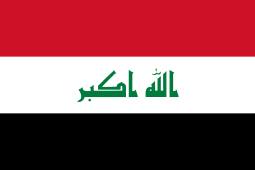 Iraq
Iraq
Facing strong domestic opposition in Turkey, a government motion to allow U.S. troops to attack Iraq from Turkey's border failed to reach the necessary majority in 2003. A primary concern for Turkey was an independent Kurdish state arising from a destabilised Iraq; it has previously fought an insurgent war on its own soil, in which an estimated 37,000 people lost their lives, against the PKK (listed as a terrorist organization by a number of states and organisations, including the U.S. and the EU).[72]
The United States' reluctance to threaten the relative stability of northern Iraq by launching operations against the PKK led the Turkish Parliament to authorise a cross border military operation in 2007.[73] On 22 February 2008, the Turkish Armed Forces launched a ground operation in northern Iraq against the PKK militants in a move described as the first significant Turkish ground offensive into Iraq since the fall of Saddam Hussein's regime in 2003.[74] The ground offensive was preceded by air strikes of the Turkish Air Force against the PKK camps in northern Iraq, which began on 16 December 2007.[75] Turkey's armed forces stepped up their offensive against Kurdish militants in northern Iraq on 27 February 2008 amid rising diplomatic tensions between Baghdad and Ankara.[76] The Turkish military pulled out of northern Iraq on 29 February 2008.[77] Turkish troops fired artillery shells into northern Iraq on 5 March 2008.[78]
Current relations with Iraqi Kurdistan are good, which is important to help prevent a restart of the Turkey–PKK conflict and to diversify Turkey's energy sources.[79][80]
 Israel
Israel
Turkey was the first country with a Muslim majority to formally recognize the State of Israel, on 28 March 1949; before Israel was admitted to the United Nations on 11 May 1949.[81] The founders of the State of Israel and prominent Israeli politicians such as David Ben-Gurion, Yitzhak Ben-Zvi and Moshe Shertok had all studied in the leading Turkish schools of Istanbul in their youth, namely Galatasaray High School and Istanbul University.
The history of the Jewish-Turkish relations dates back to 14th–16th centuries, when the Ottoman Sultan Beyazid II invited the Sephardic Jews fleeing the Spanish and Portuguese Inquisitions to settle in the Ottoman Empire. The later record of warm relations in the 19th century, when the British Prime Minister Benjamin Disraeli, himself of Jewish origin, supported the Ottoman Empire in numerous disputes, particularly in the Berlin Congress of 1878. During the 1930s and 1940s, the Republic of Turkey again served as a safe haven for the European Jewish refugees fleeing the Nazi-perpetrated Holocaust.[82] A Turkish diplomat, Selahattin Ulkumen, is honoured as one of the Righteous Among The Nations for his work in rescuing Jews from Nazi officials on the island of Rhodes, by issuing them Turkish visas and later arranging for their transport to Turkish territory. Another diplomat, Necdet Kent, also rescued Jews from Nazi authorities, for which he was awarded a special medal by the government of the State of Israel.
During the late 20th century, Israel has been a major supplier of arms to Turkey. Military, strategic, and diplomatic cooperation between Turkey and Israel is accorded very high priority by the governments of both countries, which share concerns with respect to the regional instabilities in the Middle East.[83][84] In the book Israel's Secret Wars, Benny Morris provides an account of how Mossad operatives based in Turkey infiltrated into Iraq and orchestrated a number of Iraqi Kurdish uprisings to weaken the Iraqi government. It has been reported that the Israeli Mossad played a role in the capture of the PKK leader Abdullah Öcalan in 1999.[85] The Israeli and Turkish navies conducted joint exercises. Turkey also provided its large air space (something Israel lacks) to the jets of the Israeli Air Force for training purposes, particularly the area around the Konya Air Base in central Anatolia. There was a plan to build a massive pipeline from Turkey to supply water, electricity, gas and oil to Israel.[86] In 2000, Israel and Turkey signed a Free Trade Agreement.[87]
In the beginning of 2006, the Israeli Foreign Ministry characterized its relations with Turkey as "perfect". However, in February 2006, a visit paid by Khaled Meshal, leader of the newly elected Hamas, changed this status. Israeli diplomats went so far as to compare this visit to a possible official visit of Abdullah Öcalan (the imprisoned PKK leader) to Israel, but Turkish authorities immediately denounced this comparison as "irresponsible and erroneous". After Khaled Meshal paid an official visit to Russia, Turkish-Israeli relations entered a "cooling down" process. Some have suggested that this was only a public relations stunt to show the Islamic world that Turkey was on their side because Turkey had been silent in major issues important to Arabs and the Islamic community such as the Palestinian-Israeli conflict and the Lebanon crisis.[88]
New tensions arose in Turkish-Israeli relations during the 2008–2009 Israel–Gaza conflict. Turkey's Prime Minister Recep Tayyip Erdogan became among the most outspoken critics of Israel's conduct in the war, referring to its military operations as a "crime against humanity".[89] Although at political and military levels the two nations had continued to enjoy a close relationship, mass opinion in Turkey was turned sympathetic towards the Palestinians. Relations suffered a further blow when during the World Economic Forum in Davos at 29 January 2009, when Prime Minister Erdogan walked out of the forum in protest, frustrated that he had not been given enough time to reply to Israeli President Shimon Peres. Erdogan harshly criticized the President, stating Israel knew "very well how to kill".[90][91][92]
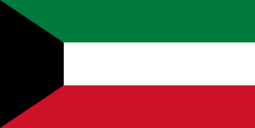 Kuwait
Kuwait
The Ministry of Foreign Affairs in Turkey describes the current relations at "outstanding levels".[93] Bilateral trade between the two countries is around 275 Million dollars. The two countries have recently signed fifteen agreements for cooperation in tourism, health, environment, economy, commercial exchange and oil.[94]
 Lebanon
Lebanon
On 27 December 2013, the website of the Ministry of Foreign Affairs of the Republic of Turkey had the following precis for that country's relations with Lebanon (hyperlinks added):[95]
"Bilateral relations between Turkey and Lebanon gained a new momentum especially in the period following the visit of the late Prime Minister Rafik Hariri to Turkey in 2004. After this date, many mutual visits at the level of Prime Minister and Ministers were held and bilateral relations have experienced significant improvements in various fields.
At the regional level, the fair and constructive attitude in solving problems on the agenda, especially in the Arab-Israeli issue, is the common denominator between the Lebanese people and authorities' positive approach towards Turkey.
Including its proactive stance adopted during the July 2006 war, Turkey’s efforts towards the solution of the political crisis in Lebanon, concluded with the signing of the Doha Agreement in November 2008, subsequent election of the President and the establishment of the government, have contributed to the positive image of Turkey vis-à-vis the Lebanese politicians and public opinion.
The initiatives undertaken by our Prime Minister and Minister in order to overcome the government crisis in Lebanon in the 2010-2011 periods were received with appreciation.
The operation carried out by Israel on the Mavi Marmara ship, carrying aid to Gaza, has caused great reaction in Lebanon. In many Lebanese cities support and solidarity demonstrations have been organized, Turkish flag has been raised alongside the Lebanese one.
Important bilateral agreements were signed during the period of intense relations and high-level visits in 2010, among which are:
- Agreement on Abolishment of Visa Requirement for Turkish and Lebanese Citizens, (11 January 2010)
- Training, Technical and Scientific Cooperation in the Military Field (Framework) Agreement (11 January 2010)
- Memorandum of Understanding on Cooperation in the Field of Agriculture, (11 January 2010)
- Memorandum of Understanding on Cooperation in the Field of Forestry, (11 January 2010)
- Memorandum of Understanding on Mutual Recognition of Certificates Pursuant to Regulation 1/10 of the International Convention on Standards of Training, Certification and Watchkeeping for Seafarers (11 January 2010)
- Agreement on Cooperation in the Field of Health (11 January 2010)
- Association Agreement between the Republic of Turkey and the Republic of Lebanon (Free Trade Agreement) (24 November 2010)
- Joint Political Declaration on the Establishment of High-Level Strategic Cooperation and Coordination Council (24 November 2010).
On the other hand, in the margin of the Turkish-Arab Forum held on 9–10 June 2010 in Istanbul, Ministers of Foreign Affairs of Turkey, Jordan, Syria and Lebanon, advanced the cooperation in the region by announcing the Joint Declaration on the establishment of Quadripartite High-Level Strategic Cooperation.
During the visit to Lebanon of H.E. Recep Tayyip Erdoğan, Prime Minister of the Republic of Turkey, on 24–25 November 2010, the Joint Political Declaration on the establishment of the High Level Strategic Cooperation and Coordination Council was signed. Although the first meeting of the Council could not take place due to the government crisis in Lebanon, common works are underway for the agreements to be signed during this meeting."
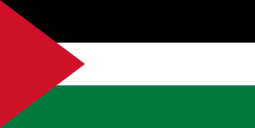 State of Palestine
State of Palestine
 Qatar
Qatar
Qatar and Turkey have improved relations for several years. Both countries mainly have cooperation over regional developments such as the civil war in Syria and the Egyptian crisis. However, analysts believe both countries' relations lack substance in terms of economic, cultural and social ties.[96]
On 2 December 2015, during a Turkish presidential visit to Qatar, Tamim bin Hamad and Tayyip Erdoğan announced the planned creation of a Turkish military in Qatar; a first for Turkey in the Persian Gulf.[97]
 Saudi Arabia
Saudi Arabia
Saudi Arabia has an embassy in Ankara and a consulate–general in Istanbul.[98] Turkey has an embassy in Riyadh and a consulate–general in Jeddah.[99][100]
 Syria
Syria
Syrian–Turkish relations have long been strained even though Turkey shares its longest common border with Syria and various other geographic, cultural, and historical links tie the two neighbouring states together. This friction has been due to disputes including the self annexation of the Hatay Province to Turkey in 1939, water disputes resulting from the Southeastern Anatolia Project, and Syria’s support for the outlawed Kurdistan Workers' Party (PKK). Relations, in the form of recent trade agreements and joint military maneuvers, have improved greatly since October 1998, when PKK leader Abdullah Öcalan was expelled by Syrian authorities.
The Turkish-Syrian relationship showed great improvement when Turkey and Syria have cancelled entry visas and signed joint declaration of strategic council in 2009.
Due to the 2011 Syrian uprising, Turkey has suspended diplomatic contact with Syria.[101]
On 22. June 2012 the Syrian military shot down a Turkish F-4 Phantom fighter jet after it had entered Syrian airpsace over the Mediterranean Sea.[102]
Central Asia
Turkey has strong cultural and linguistic ties with the predominantly Turkic nations of Central Asia since Turks originated in Central Asia themselves. Economic and political relations are developing rapidly, and are likely to grow even more quickly with Turkey's recent elimination of visa requirements for citizens of the Central Asian Turkic republics. The Economic Cooperation Organization (ECO) has formed an alliance of trade between Turkey and the Central Asian states. Turkey is even working on developing solid relations with the other nations of the region, namely Afghanistan and Tajikistan.
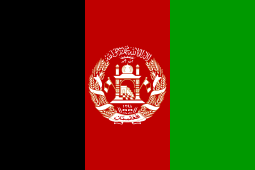 Afghanistan
Afghanistan
Afghanistan–Turkey relations have always been warm due to strong ethnic and historical links between the two modern states. Afghanistan was the second country to recognize the Republic of Turkey, after the Soviet Union, establishing diplomatic contacts whilst the Turkish War of Independence was still being waged. Turkey has participated in the International Security Assistance Force (ISAF) since its inception in 2001 and is responsible for maintaining security around Kabul, providing training for the Afghan National Army and Afghan National Police and has undertaken a number of reconstruction projects in the fields of education, health and agriculture in the province of Vardak. Afghan President Hamid Karzai visited Ankara on 4 April 2002 and Turkish Prime Minister Recep Tayyip Erdoğan made a reciprocal visit to Kabul a short time later.
Ahmet Davutoğlu has described this relationship as "exemplary" even if the two countries do not border, but are close. A recent survey in Kabul of 1,259 people shows that Afghanistan rely mostly on Turkey, and consider Turkey to be Afghanistan's one and only true, best friend (as of July 2012). Afghanistan are also constantly referred to 'brothers' in Turkey. Generally it is said that “Turkey is Afghanistan’s closest neighbor without common borders”[citation needed].. There are two opinions which compose the fundamentals of Turkish-Afghan relations. It is said in Afghanistan “no Afghan was ever killed by a Turkish bullet” and “no Afghan trained by Turks has ever betrayed his country”. Afghanistan was also the second nation to recognise the Republic of Turkey, after the Soviet Union, on 1 March 1923.
Since the 1920s Turkey enjoyed its prestige in Afghanistan.[citation needed] Both countries established education and cultural exchange programs. Inside Afghanistan Turkish schools were established. Furthermore, Turkish army officers assisted or even commanded the training of Afghan military members. The foreign relations of Afghanistan have changed so much politically, socially and economically. Today the relations between the two countries go beyond giving military education. In this respect it is noteworthy that this article handles the developments in the relationship between Afghanistan and Turkey in historical context.
Afghan and Turkish relations spans several centuries, as many Turkic and Afghan peoples ruled vast areas of Central Asia and the Middle East particularly the Ghaznavids, Khilji, Timurid, Lodhi, Mughal, Afsharid, and Durrani empires. Throughout its long history, many Ottoman officials were in close contact with Afghan leaders even up until the early 20th century when the Ottoman administrator Ahmad Jamal Pasha went to Afghanistan where he worked on modernizing the Afghan armed forces. Ertuğrul Osman, the current head of the Imperial Ottoman Dynasty, is married to Zeynep Tarzi Hanım Efendi, the daughter of Abdulfettah Tarzi, niece of the former King of Afghanistan, Amanullah Khan.
Afghanistan was the second country to recognize the Republic of Turkey, after the Soviet Union, establishing diplomatic contacts whilst the Turkish War of Independence was still being waged. Talks held in Moscow on 1 March 1921 resulted in the Turkey-Afghanistan Alliance Agreement and a period of intense cooperation. In 1937, shortly before the outbreak of World War II, Afghanistan, Iran, Iraq and Turkey signed the Treaty of Saadabad.
Turkey has participated in the International Security Assistance Force (ISAF) since its inception with the deployment of 290- non-combatant support personnel in 2001 and has assumed command of ISAF II (June 2002-February 2003) and ISAF VII (February–August 2005). According to Turkish Parliamentary Deputy Burhan Kayatürk Turkey, which has the goodwill of the Afghani people, “can help win the hearts and minds of the Afghani people,” who, “like the Turkish soldiers,” and, “steer them away from militancy by strengthening the infrastructure in education, health and industry.”[3]
Turkish troops have not participated as combat forces but rather as logistical support and training Afghan personnel. Over 12,000 afghan soldiers and police have been trained.[4]
Turkish construction firms have subsequently also become active in the country.[citation needed] Turkey is responsible for maintaining security around Kabul, providing training for the Afghan National Army and Afghan National Police and have undertaken a number of reconstruction projects in the fields of education, health and agriculture in the province of Vardak. Turkey’s support of the Bonn Agreement and the Afghan Constitution Commission resulted in an official visit to Turkey by Afghan President Hamid Karzai on April 4, 2002 and made a reciprocal visit to Afghanistan by Turkish Prime Minister Recep Tayyip Erdoğan a short time later.
Turkey launched a trilateral summit process between the two states and Pakistan in February 2007, following a visit by then Turkish Foreign Minister Abdullah Gül to Islamabad, as the backbone of its diversified foreign policy in Southeast Asia and Pakistani deputy Humair Hayat Khan Rokhri confirmed that according to Gül “we are all brothers who need to support each other,” in order to, “bring security and stability to the region.”[5]
An April 1, 2009 meeting between Afghan and Pakistani leaders, conducted as part of the trilateral Ankara cooperation process, saw the three countries pledged to increase coordination between their political, military and intelligence tiers in the fight against militancy and terrorism. Turkish Parliamentary Deputy Kayatürk has stated that, “It is the first time that the military and intelligence chiefs of Afghanistan and Pakistan have attended the trilateral summit, which is a reflection of the deeper commitment to work together.”[3]
Afghan and Pakistani parliamentary deputies came together in Ankara on May 5, as part of the trilateral Ankara cooperation process, where they met with the now Turkish President Gül and new Foreign Minister Ahmet Davutoğlu to discuss a variety of issues. Head of the Turkish Parliament’s Foreign Relations Commission Murat Mercan stated;
“Today we need cooperation between our countries more than ever. I believe Turkey, having historical brotherhood relations with both, is in a special position to improve and deepen this cooperation. Turkey is confident that the cooperation to be established between Afghanistan and Pakistan will help a lot to solve the problems.”[6]
Vice-Chairman of the Afghan Parliament’s Foreign Relations Commission Mohammed Shakir Kargar responded by reaffirming this historical friendship built upon by Atatürk and thanked Turkey for its help with the post-Taliban restructuring. Mercan concluded, “We are finally on the verge of institutionalising the trilateral Ankara cooperation process within the framework of parliamentary joint initiatives,” with follow-up meetings due to be held in Islamabad and Kabul at four-month intervals.
After the very controversial 2009 election, President Karzai visited the President of Turkey in November 2009 to consolidate relations with other stakeholders in the region.[7] The president of Turkey affirmed that Turkey had to take an active part in stabilizing the region, taking up the torch of western activity in the region and specifically in Afghanistan.[7]
The Embassy of Afghanistan in Ankara (Persian: سفارت كبرای جمهوری اسلامی افغانستان در انقره) is the diplomatic mission of the Islamic Republic of Afghanistan to Turkey. It is located at Cinnah Street 88, Kavaklıdere, Çankaya.
The current Afghan ambassador to Turkey is H.E. Salahuddin Rabbani
 Kazakhstan
Kazakhstan
Turkey recognized Kazakhstan on 16 December 1991, on the same day Kazakhstan declared its independence. Diplomatic relations between the two countries were established on 2 March 1992. These relations have developed positively on the international stage as well as in commerce and strategic affairs.[103] Kazakhstan has an embassy in Ankara and a consulate general in Istanbul. Turkey has an embassy in Almaty and a branch office in Astana.
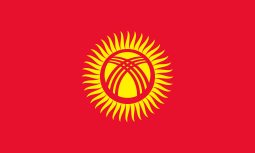 Kyrgyzstan
Kyrgyzstan
Turkish President Abdullah Gül made a 26–28 June official visit to Bishkek where he met with Kyrgyz President Kurmanbek Bakiev and Prime Minister Igor Chudinov to discuss bilateral relations, with Gül stating, “We have determined that we have a joint will with regard to our bilateral relations and multilateral relations. We share the conviction that we attach great importance to the stability of Afghanistan in particular and that we should provide all sorts of assistance regarding this issue.”[104][105] Gül subsequently announced, in a speech at the International Atatürk-Alatoo University (IAAU), that, “Kyrgyzstan is our ancestral homeland. We have felt at home in our ancestral homeland while we have been in Kyrgyzstan,” and added, in a speech to the Jogorku Kenesh, that, “You are being represented in Europe through us, and were being represented in the Commonwealth of Independent States through you. I believe that this is important.”[106] He also laid the foundation stone for the new Turkish Embassy in Bishkek.
Turkey is one of Kyrgyzstan's major trade partners. It is estimated that some 30% of all imported goods sold at Bishkek's Dordoy Bazaar come from Turkey.[107] It is estimated that some 400–500 Kyrgyzstan traders engage in "shuttle trade", regularly traveling to Turkey to purchase goods for sale in their (or others') shops in Kyrgyzstan's markets. With their knowledge of Kyrgyz and Uzbek languages, and many Istanbul merchant's familiarity with Russian, many Kyrgyzstan traders sometimes manage to do their purchasing in Turkey without having to learn the Turkish language.[107]
There is academic exchange between the two countries as well. Turkey provides support for a number of universities in Kyrgyzstan, while many scholars from Kyrgyzstan are attracted to the opportunities to teach in Turkey.[107] Also, Kyrgyz Republic is in Turkic Council.
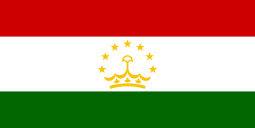 Tajikistan
Tajikistan
Turkey recognized the independence of Tajikistan on 16 December 1991 and established diplomatic relations on 29 January 1992. The Turkish Embassy in Dushanbe was opened on 4 August 1992 and the Tajik Embassy in Ankara was opened on 16 October 1995.
Turkey’s relations with Tajikistan are considered within the framework of relations with other Central Asian republics but developed more slowly due to Tajikistan’s internal war between 1992 and 1997. During this period the Turkish embassy in Dushanbe was the only diplomatic mission which remained open and the visit of Turkish Prime Minister Suleyman Demirel was the only high level visit to Tajikistan.
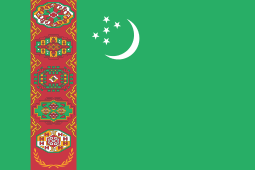 Turkmenistan
Turkmenistan
Turkmenistan is inhabited by Turkic people, who share a cultural affinity with Turks.
Africa
There has been a revival in Turkey’s relation with Africa after 1998 and civil society is the leading factor in this process.[108] Initially this revival came as a passive attempt, but after 2005 it became an offensive interest in developing relations with the continent. The recent Turkey-Africa Cooperation Summit in 2008 marks the latest stage in Turkey’s keen interest in developing relations with Africa, and should be seen as a turning point.[109] Turkey since its involvement in Somalia in 2011, is eager to be considered as a political actor in the continent.[110]
 Algeria
Algeria
Algeria has an embassy in Ankara, and a general consulate in Istanbul.[111] Turkey has an embassy in Algiers.[112]
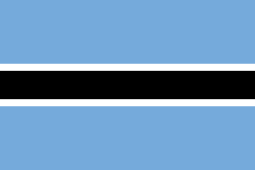 Botswana
Botswana
Diplomatic relations between Botswana and Romania were established on October 7, 1971.[113]
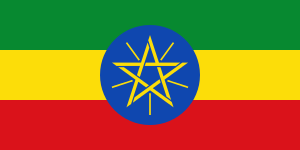 Ethiopia
Ethiopia
Ethiopia has an embassy in Ankara. Turkey has an embassy in Addis Ababa since 1925. Turkey was the sixth country to open an embassy in Ethiopia. Today the relations between the two countries are described as excellent, both politically and economically.[114] In December 2008, Turkey sent a trade delegation to Ethiopia, which met with the Prime Minister, the Minister of Trade and Industry Girma Biru, and the President of the Oromia Region Abadula Gemeda, as well as visited Turkish-owned textiles factories in Ethiopia.[115] A senior official of the Ministry of Foreign Affairs, who attended the discussion, expressed the hope that Turkey could share its experience and provide assistance to ongoing efforts to rehabilitate and extend its railway system.[116]
 Kenya
Kenya
Turkey has an embassy in Nairobi but Kenya has no embassy in Turkey.[117]
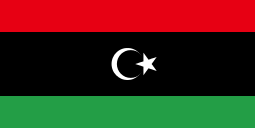 Libya
Libya
Libya has an embassy in Ankara, and a general consulate in Istanbul. Turkey has an embassy in Tripoli and a general consulate in Benghazi.
 Morocco
Morocco
Morocco has an embassy in Ankara. Turkey has an embassy in Rabat.[118]
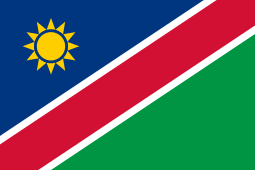 Namibia
Namibia
Turkey has opened an embassy in Windhoek on January 4, 2012 and Namibia is represented in Turkey through its embassy in Berlin, Germany and an honorary consulate in Istanbul.[119]
 Nigeria
Nigeria
Nigeria has an embassy in Ankara. Turkey has an embassy in Abuja.[120]
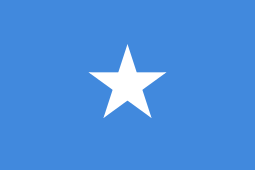 Somalia
Somalia
Relations between the present-day territories of Somalia and Turkey date back to the Middle Ages and the ties between the Adal Sultanate and the Ottoman Empire. The two kingdoms were allies during the Abyssinian–Adal conflict.[121]
In 1969, Somalia and Turkey were among the founding members of the Organisation of Islamic Cooperation (OIC).
Turkey originally maintained an embassy in Mogadishu, Somalia's capital, until the outbreak of the Somali Civil War in 1991. It subsequently discontinued operations due to security reasons.[122]
Over the ensuing interim period, the Turkish authorities continued relations with Somalia's newly established Transitional National Government and its successor the Transitional Federal Government through their non-resident diplomatic mission in Addis Ababa.[122]
Following a greatly improved security situation in Mogadishu in mid-2011, the Turkish government re-opened its foreign embassy with the intention of more effectively assisting in the post-conflict development process.[123] It was among the first foreign administrations to resume formal diplomatic relations with Somalia after the civil war.[124]
 South Africa
South Africa
- Diplomatic relations were established at consular level in 1991 and consulates-general were opened in Istanbul and Johannesburg respectively.
- Both consulates were closed following the upgrading of relations to ambassadorial level in October 1992.
- South Africa has an embassy in Ankara.[125]
- Turkey has an embassy in Pretoria.
- See also Turks in South Africa
- Turkish Ministry of Foreign Affairs about relations with South Africa
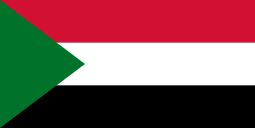 Sudan
Sudan
Sudan has an embassy in Ankara. Turkey has an embassy in Khartoum.[126] Although on opposing sides of the Peace Process in the Israeli-Palestinian Conflict spectrum, Turkey and Sudan have in recent years joined forces to end the ongoing conflict between the Israelis and the Palestinians. Both countries have made repeated plea talks during the offensive in Gaza during the beginning of 2009 to Palestinian officials to be of both economic and political aid to the turmoilic state. Turkey also showed interest in Darfur crisis and followed a policy of so-called "passive quiet diplomacy".[127]
 Tunisia
Tunisia
See Tunisian–Turkish relations
Tunisia has an embassy in Ankara and a consulate-general in Istanbul. Turkey has an embassy in Tunis.[128]
Americas
| Country | Formal Relations Began | Notes |
|---|---|---|
See Argentine–Turkish relations
| ||
|
Turkey has a non-resident ambassador in Caracas, Venezuela. The Barbadian Government does not have foreign accreditation for Turkey. Barbados and Turkey formally established joint diplomatic relations on 20 September 1972.[129] Barbadian and Turkish economic trade are not very significant, however as of April 2009 both countries have discussed the desire for expanding a bilateral framework for possible cooperation in tourism.[130][131] The diplomatic representative of Turkey, Nihat Akyol and his Barbadian counterpart the Minister of Foreign Affairs revealed that they could "provide support to each other" and that they should not view each other as "competitors".[130][132] | ||
| See Brazil–Turkey relations
Brazil has an embassy in Ankara.[133] Turkey has an embassy in Brasília and a Consulate General in São Paulo. Both countries are members of the World Trade Organization (WTO). | ||
| See Canadian–Turkish relations
Canada has an embassy in Ankara. Turkey has an embassy in Ottawa. The recognition of the Armenian Genocide by the Canadian parliament has soured relations between the two countries.[134] | ||
| See Chilean–Turkish relations
Chile was the first country in Latin America which recognized Turkey with the Friendship Treaty, on 30 January 1926.[135] In Santiago, there can be found the Turkish Republic Square, Atatürk College[136][137] and Atatürk monument.[138] The Turkish embassy in Chile is the first embassy of Turkey opened in Latin America. In addition Turkey includes a Chile Square in Ankara inaugurated on 18 September 1970 that contains the Bernardo O'Higgins Monument.[138][139] The Pablo Neruda square in Turkey was inaugurated in 2007.[138] | ||
| 2006[140] |
Diplomatic relations were established on April 2006 in New York.[140] | |
See Mexico–Turkey relations
|
 United States
United States

Friendship between Turkey and the United States dates to the late 19th century, when Turkey was part of the Ottoman Empire, and was officially sealed by a treaty in 1830. The close relationship between the modern Republic of Turkey and the United States began with the Second Cairo Conference on 4–6 December 1943, and the agreement of 12 July 1947 which implemented the Truman Doctrine. As part of the cooperative effort to further improve Turkish economic and military self-reliance, the United States has loaned and granted Turkey more than $12.5 billion in economic aid and more than $14 billion in military assistance.
Turkey participated with the United States during the Korean War of the early 1950s, providing active military support to the U.S. forces. During the Gulf War of 1990, the Turkish Armed Forces contributed to the coalition forces, and Turkey supported the initiatives of the U.S. in the region. Turkey has hosted the Incirlik Air Base, a major operations base of the United States Air Force, since 1954. Following its membership in 1952, Turkey became the bulwark of NATO's southeastern flank, directly bordering Warsaw Pact countries and risking nuclear war on its soil during the Cuban missile crisis.

In the post Cold War environment, though still committed to its close relations with Washington, Turkey became a more independent actor. Although Turkey supported the United States in the NATO-led peacekeeping mission in Afghanistan, there was strong domestic opposition to the Iraq War. A government motion to allow U.S. troops to attack Iraq from Turkey's border failed to reach the necessary majority. This led to a cooling in relations between the U.S. and Turkey and fears of a permanent rift due to the situation in Iraq.[144] A crucial factor here has been the determination by some neoconservatives to present Turkey's independent foreign policy as directed against US interests.[3] Turkey is particularly cautious about an independent Kurdish state arising from a destabilised Iraq; it has previously fought an insurgent war on its own soil, in which an estimated 37,000 people lost their lives, against the PKK (listed as a terrorist organization by a number of states and organisations, including the U.S. and the EU).[72][145] This led the Turkish government to put pressure on the U.S. to clamp down on insurgent training camps in northern Iraq, without much success.[66] On 17 October 2007, the Turkish Parliament voted in favour of allowing the Turkish Armed Forces to take military action against the PKK militants based in northern Iraq.[73] In response, U.S. President George W. Bush stated that he did not believe it's in Turkey's interests to send troops into Iraq.[146]
The U.S. and Turkey have had a Joint Economic Commission and a Trade and Investment Framework Agreement for several years. In 2002, the two countries indicated their joint intent to upgrade bilateral economic relations by launching an Economic Partnership Commission. In 2005, Turkish exports to the U.S. totaled $4.9 billion, and U.S. exports to Turkey totaled $5.3 billion.
According to leaked diplomatic cables, Erdoğan was described by US diplomats as having "little understanding of politics beyond Ankara" and as surrounding himself with an "iron ring of sycophantic (but contemptuous) advisors". He is said to be "isolated", and that his MPs and Ministers feel "fearful of Erdogan's wrath".[147] Diplomats state that "he relies on his charisma, instincts, and the filterings of advisors who pull conspiracy theories off the web or are lost in neo-Ottoman Islamist fantasies".[148] Erdogan responded strongly to the claims, threatening a lawsuit. He rejects the allegations of having "eight secret accounts in Swiss banks," stating that the people responsible for the leaks will "be crushed under these claims, will be finished and will disappear."[149]
Asia
| Country | Formal Relations Began | Notes |
|---|---|---|
|
Relations have been excellent since Turkey recognised Bangladesh in 1971, soon after independence. The trade volume between the two countries has grown as did Bangladeshi exports and has been in Bangladesh's favor throughout their economic relationship. Bangladesh was one of the only six countries to support the Turkish invasion of Cyprus during a UN vote on the matter. On the issue of Cyprus, Bangladesh at multilateral organisations such as the UN, use this as an opportunity to defend the rights of the Turkish community. They also supported the creation of the Developing 8 Countries with six other nations with large Muslim populations. However, when Turkish President Abdullah Gul wrote a letter [150] to Bangladesh President Zillur Rahman requesting 91-year old Islamic leader not to be executed Bangladesh government became angry.[151] | ||
| See Chinese–Turkish relations
Turkey recognized the PRC on 5 August 1971. Turkey pursues One-China policy and recognizes the PRC as the sole legal representative of China. The PRC has an embassy in Ankara, and a consulate–general in Istanbul. Turkey has an embassy in Beijing and 2 consulates–general in Hong Kong and Shanghai.Tensions between Chinese people and uyghur communities is always a hurdle as the latter have Turkish origin | ||
| See Indian–Turkish relations
Despite its close supportive bond with its geopolitical rival, Pakistan, Turkey's relations with India have always been generally friendly and stable, though at certain times cold. The two nations have been in contact with each other since the early times of the Ottoman Empire; Turkey and India work closely with each other to fight cultural terrorism in the Middle East, Central, and South Asia. India was also one of many countries to recognize the newly independent Turkey and send political aid to combat the subsequent poverty and benefit the war effort. | ||
| See Indonesia–Turkey relations
Indonesia has an embassy in Ankara. Turkey has an embassy in Jakarta.[154] This relationship began in the 16th century when the Muslim sultan of Java requested help from the Ottoman Turkish Caliph to resist the Portuguese colonization attempts in the region, which was replied with a large contingent of ships and soldiers whose efforts to help their Muslim brothers mark to this day the close relationship between Indonesia and Turkey. | ||
| 1924 | See Japan–Turkey relations | |
| 1964 | See Malaysian–Turkish relations
| |
See Mongolian–Turkish relations
| ||
| See Pakistani–Turkish relations
Pakistan has an embassy in Ankara, a Consulate-General in Istanbul and an honorary consulate in Izmir whereas, Turkey has an embassy in Islamabad, a Consulate-General in Karachi and honorary consulates in Lahore, Peshawar, Sialkot and Faisalabad. Relations between the two date back generations before the establishment of the two states, more precisely during the Turkish War of Independence when the Muslims of modern Pakistan sent financial aid to the declining Ottoman Empire which was followed by the formation of the Turkish Republic. As a result, Pakistan and Pakistanis have enjoyed a positive perception in Turkey and amongst Turks for many decades. | ||
| June 13, 1949 | See Philippines–Turkey relations, Filipinos in Turkey
Turkey established its resident embassy in Manila in 1990 and an honorary consulate in Cebu in 1992. The Philippines established its resident embassy in Ankara in October 1991. | |
| See Foreign relations of North Korea | ||
| 8 March 1957[159] | See Foreign relations of South Korea
| |
See Turkish–Vietnamese relations
|
Pacific
 Australia
Australia

Diplomatic relations between the two countries established in 1967. Australia has an embassy in Ankara since 1968, a consulate-general in Istanbul and a consulate in Çanakkale. Turkey has an embassy in Canberra since 1967 and two consulates-general in Melbourne and Sydney.
The first encounter of Turkey and Australia was on the battlefields of Çanakkale.
 New Zealand
New Zealand
The relationship between Turkey and New Zealand is excellent, with great mutual respect based on the ANZAC traditions forged in the Battle of Gallipoli. Governor-General of New Zealand Sir Anand Satyanand visited Turkey for the annual commemoration of Anzac Day on 25 April 2009 stating that his country was “Turkey’s traditional ally,” and the Gallipoli battles commemorated, “are the first example of friendship created on the battlefield. This understanding owes its existence mostly to the peace building words of Atatürk.” He also wished Turkey luck with its EU accession bid and waited on the successful outcome for prospective trade opportunities.[162]
International organizations
Turkey is a founding member of the UN (1945),[163] the Organisation for Economic Co-operation and Development (1961),[164] the Organisation of Islamic Cooperation (1969),[165] the Organization for Security and Co-operation in Europe (OSCE) (1973),[166] and the G20 industrial nations (1999). Turkey is a member state of the Council of Europe (1949) and NATO (1952) as well as being in full accession negotiations with the European Union since 2005, having been an associate member since 1963. Turkey was also an associate member of the Western European Union from 1992 to 2011, and signed the E.U. Customs Union agreement in 1995.
Turkey entered NATO in 1952 and serves as the organization's vital eastern anchor, controlling the Turkish Straits which lead from the Black Sea to the Mediterranean and sharing a border with Syria, Iraq, and Iran. A NATO headquarters is located in İzmir, and the United States has maintained air forces at the Incirlik Air Base in the province of Adana.
Turkey is also a member of the World Trade Organization (WTO) since 1995. It has signed free trade agreements with the European Free Trade Association (EFTA), Israel, and many other countries. In 1992, Turkey and 10 other regional nations formed the BSEC to expand regional trade and economic cooperation.
See also
- Turkish Modern Relations
- List of diplomatic missions in Turkey
- List of diplomatic missions of Turkey
- Visa requirements for Turkish citizens
References
- ↑ Taspinar, Omer (September 2008). "Turkey's Middle East Policies: Between Neo-Ottomanism and Kemalism". Carnegie Endowment for International Peace. Retrieved 5 June 2010.
- ↑ Murinson, Alexander (2009). Turkey's Entente with Israel and Azerbaijan: State Identity and Security in the Middle East and Caucasus (Routledge Studies in Middle Eastern Politics). Routledge. p. 119. ISBN 0-415-77892-1.
- 1 2 Kubilay Yado Arin: The AKP's Foreign Policy, Turkey's Reorientation from the West to the East? Wissenschaftlicher Verlag Berlin, Berlin 2013. ISBN 9 783865 737199.
- ↑ Kubilay Yado Arin: The AKP's Foreign Policy, Turkey's Reorientation from the West to the East? Wissenschaftlicher Verlag Berlin, Berlin 2013, pp. 57-84. ISBN 9 783865 737199.
- ↑ Embassy of Belgium in Turkey
- ↑ "Embassy of Turkey in Brussels". Bruksel.bk.mfa.gov.tr. Retrieved 28 September 2010.
- ↑ "Consulate–General of Turkey in Antwerp". Anvers.bk.mfa.gov.tr. 16 September 2010. Retrieved 28 September 2010.
- ↑ "Danish Business Delegation to Turkey" (PDF). Royal Danish Ministry of Foreign Affairs. Retrieved 11 December 2010.
Trade between our two countries can be dated centuries back. In 1756 Denmark and The Ottoman Empire signed a treaty on commerce and friendship, which paved the way for closer ties both human and commercial between our two people...
C1 control character in|quote=at position 181 (help) - ↑ "Danish embassy in Ankara". Ambankara.um.dk. 14 January 2008. Retrieved 28 September 2010.
- ↑ "Turkish embassy in Copenhagen". Turkishembassy.dk. Retrieved 28 September 2010.
- ↑ "Embassy of Finland in Ankara". Finland.org.tr. Retrieved 28 September 2010.
- ↑ "Embassy of Turkey in Helsinki (in Turkish and Finnish)". Turkishembassy-helsinki.eu. Retrieved 28 September 2010.
- ↑ "Turkish embassy in Budapest". Bukres.be.mfa.gov.tr. Retrieved 28 September 2010.
- ↑ "Embassy of Turkey in Ireland". Dublin.be.mfa.gov.tr. Retrieved 28 September 2010.
- ↑ "ambasciataditurchia.it". Retrieved 18 May 2016.
- ↑ Polish embassy in Ankara Archived 29 December 2012 at the Wayback Machine.
- ↑ "Portuguese embassy in Ankara". Portugalembassy.org.tr. Retrieved 28 September 2010.
- ↑ "Turkish embassy in Madrid". Tcmadridbe.org. Retrieved 28 September 2010.
- ↑ "Turkey Has Friends in EU, Swedish Prime Minister Fredrik Reinfeldt". Turkish Weekly. 21 April 2009. Retrieved 22 May 2009.
- ↑ "EU'S UPCOMING PRESIDENT EXTENDS FULL SUPPORT FOR TURKEY'S MEMBERSHIP". TurkNet. 08/05/2009. Retrieved 22 May 2009. Check date values in:
|date=(help) - ↑ "Sweden's Greens: Opposition to Turkey due to Islamophobia". Today's Zaman. 11 May 2009. Archived from the original on 28 May 2009. Retrieved 22 May 2009.
- ↑ "German, French Leaders Oppose Turkey Joining EU". The Wall Street Journal. Archived from the original on 14 May 2009. Retrieved 22 May 2009.
- ↑ "Swedish Parliament Refuses to Recognize the Armenian Genocide". Armtown.com. 12 June 2008. Retrieved 28 September 2010.
- ↑ "Welcome to the British Embassy Turkey" britishembassy.gov.uk Link accessed 29 May 2008
- ↑ "Welcome to Turkey" turkey.embassyhomepage.com Link accessed 29 May 2008
- ↑ "Bilateral Relations" britishembassy.gov.uk Link accessed 29 May 2008
- 1 2 "Ceremonies: State visits". Official web site of the British Monarchy. Retrieved 26 November 2008.
- ↑ "Outward state visits made by the queen since 1952". Official web site of the British Monarchy. Retrieved 26 November 2008.
- ↑ Mesut Yilmaz told BirGün about the dark years, BirGün, Monday 23 December 2011 (in Turkish)
- ↑ Former Turkish PM's arson admission fuels anger, Kathimerini, Tuesday 27 December 2011
- ↑ Greece demands official response from Ankara on forest fires, Zaman, Wednesday 28 December 2011
- ↑ Turk-Greek Ties Strained by Arson Row, Journal of Turkish Weekly, Friday 30 December 2011
- ↑ "Greek, Turkish foreign ministers discuss fire comment", Kathimerini, Saturday 31 December 2011
- ↑ Turkish daily cites report supporting wildfire claims, Kathimerini, Saturday 31 December 2011
- ↑ "Turkish Ministry of Foreign Affairs about relations with Albania". Mfa.gov.tr. Retrieved 28 September 2010.
- ↑ Turkish embassy in Sofia
- ↑ "Turkey to open embassy in Kosovo". Turkishdailynews.com.tr. 24 September 2010. Retrieved 28 September 2010.
- ↑ "A baby brother to Turkey, Kosovo born in Europe". Turkishdailynews.com.tr. 24 September 2010. Retrieved 28 September 2010.
- ↑ Kosovo in figures 2005 Archived 17 December 2008 at the Wayback Machine.
- ↑ "Moldovan embassy in Ankara". Embassypages.com. Retrieved 28 September 2010.
- ↑ "Turkey, Serbia sign deal on defense industry ties". Today’s Zaman. 13 May 2009.
- ↑ "Serbian defense minister: War with Kosovo not possible". Today’s Zaman. 14 May 2009.
- ↑ "Erdoğan to visit Russia next month, report says". Today’s Zaman. 25 April 2009.
- ↑ "Erdoğan seeks Russian backing in Karabakh peace effort". Today’s Zaman. 16 May 2009.
- ↑ "Putin to visit Turkey next month". Today’s Zaman. 20 May 2009.
- ↑ "Russia presents proof of Turkey's role in ISIS oil trade". RT English. Retrieved 2015-12-09.
- ↑ "Turkey detains & deports Russian journalists investigating ISIS oil trade reports". RT English. Retrieved 2015-12-09.
- ↑ "Moscow expects 'unpredictable' Ankara will avoid further reckless actions". RT English. Retrieved 2015-12-09.
- ↑ Natasha Bertrand (3 December 2015). "Russia presented 'evidence' of Turkey's oil ties to ISIS — but it has a crucial flaw". Business Insider. Retrieved 9 December 2015.
- ↑ "Russia Lashes Out at Turkey Over Troops in Iraq". VOA. 2015-12-08. Retrieved 2015-12-09.
- ↑ "Turkey´s Political Relations With Ukraine". Republic of Turkey Ministry of Foreign Affairs. Archived from the original on 16 September 2010. Retrieved 16 September 2010.
- ↑ "Turkish embassy in Kiev" (in Turkish). Archived from the original on 16 September 2010. Retrieved 16 September 2010.
- ↑ "Ukrainian embassy in Ankara". Archived from the original on 16 September 2010. Retrieved 16 September 2010.
- ↑ "Samast'a jandarma karakolunda kahraman muamelesi/Katili bir alnından öpmedikleri kalmış". Radikal (in Turkish). 2 February 2007. Retrieved 10 February 2007.
- ↑ "Gul in landmark visit to Armenia". BBC News. 6 September 2008. Retrieved 12 September 2008.
|section=ignored (help) - ↑ Paul Richter (3 April 2009). "Turkey, Armenia are likely to ease conflict". Los Angeles Times. Retrieved 3 April 2009.
- ↑ ANKARA – Agence France-Presse. "Turkey, Armenia to sign diplomatic deal next month, says official – Hurriyet Daily News and Economic Review". Hurriyetdailynews.com. Retrieved 27 April 2010.
- ↑ "President Sarkisian Announces Suspension of Protocols". The Armenian Weekly. Armenian Weekly. 22 April 2010. Archived from the original on 16 September 2010. Retrieved 16 September 2010.
- ↑ Cansever, Enes. "Turkey in decade's best economic, trade phase with Azerbaijan". Today's Zaman. Archived from the original on 17 January 2010. Retrieved 17 August 2010.
- ↑ Aslanov, Dr.Elnur. "Azerbaijan and Turkey – shoulder to shoulder!". Hurriyet Newspaper. Retrieved 17 August 2010.
- ↑ Morris, Chris (2005). "Chapter 9: Crossroads". The New Turkey. London: Granta Books. pp. 203–227. ISBN 1-86207-865-3.
- ↑ "Turkey 2007" – Turkish Foreign Policy Chapter – Government of Turkey Publication
- ↑ Koker, Irem. "Greek Cypriots may block more chapters in Turkey's EU negotiations". HurriyetDailyNews.com. Archived from the original on 16 September 2010. Retrieved 16 September 2010.
- ↑ Keohane, Daniel (June–July 2006). "Unblocking EU-NATO Co-operation". Centre for European Reform. Archived from the original on 16 September 2010. Retrieved 16 September 2010.
- 1 2 "Turkey 2007" Government of Turkey
- 1 2 Singh, K. Gajendra (3 August 2004). "Turkey and Iran coming closer". South Asia Analysis Group. Archived from the original on 11 June 2007. Retrieved 17 December 2006.
- ↑ "Radical Islamic political groups in Turkey". MERIA.
- ↑ "Erdogan: Iran, Turkey against disintegration of Iraq". Islamic Republic News Agency. 5 December 2006. Archived from the original on 10 February 2007.
- ↑ "Turkey, Iran ready to bolster tourism". Turkish Daily News. Dogan Daily News Inc. 19 June 2006. Archived from the original on 6 September 2007.
- ↑ Koumelis, Theodore (20 June 2006). "Turkey and Iran sign MoU to extend tourism cooperation". TravelDailyNews.com.
- ↑ "Tehran Prioritizes TAV for Imam Khomeini Airport Bid". The Journal of Turkish Weekly. International Strategic Research Organization. 5 April 2006. Archived from the original on 27 September 2007.
- 1 2 O'Toole, Pam (26 March 2003). "Turkey's fears of Kurdish resurgence". BBC. Retrieved 17 December 2006.
- 1 2 "Turkish MPs back attacks in Iraq". BBC News. 18 October 2007. Archived from the original on 16 September 2010. Retrieved 16 September 2010.
- ↑ "Turkey launches major Iraq incursion". CNN. 23 February 2008. Retrieved 28 September 2010.
- ↑ "Turkish air force in major attack on Kurdish camps". Flight International. Retrieved 28 September 2010.
- ↑ Turkey sends more troops into Iraq Archived 8 June 2008 at the Wayback Machine.
- ↑ "Iraq incursion finished, Turkey says". CNN. 29 February 2008. Retrieved 28 September 2010.
- ↑ "Turkish troops shell northern Iraq". CNN. 5 March 2008. Retrieved 28 September 2010.
- ↑ Lister, Tim. "Destination unknown: Will Kurds use oil to break free from Iraq?". CNN. Retrieved 4 August 2014.
- ↑ "Dreams of Kurdistan". Economist. Retrieved 4 August 2014.
- ↑ [“The Palestinian Question in Turkish Foreign Policy from the 1950s to the 1990s”, International Journal of Middle Eastern Studies, Volume 25, No.: 1, February 1993 and also, http://www.smi.uib.no/pao/hawas.html]
- ↑ "David Ben-Gurion". Jewishmag.com. 14 May 1948. Retrieved 28 September 2010.
- ↑ "Analysis: Middle East's 'phantom alliance'". BBC News. 18 February 1999. Retrieved 1 April 2010.
- ↑ https://web.archive.org/web/20120220132330/http://ankara.mfa.gov.il/mfm/web/main/document.asp?subjectid=18367&missionid=65&languageid=0&statusi. Archived from the original on 20 February 2012. Retrieved 23 March 2013. Missing or empty
|title=(help) - ↑ "The Ostrovsky Files: Capture of Kurdish Rebel Leader Ocalan Recalls Mossad Collaboration With Both Turkey, Kurds". Washington-report.org. Retrieved 28 September 2010.
- ↑ Pamukcu, Konuralp (2003). "Water Trade between Israel and Turkey: A Start in the Middle East?". Middle East Policy. 10 (4): 87. doi:10.1111/j.1061-1924.2003.00132.x.
- ↑ Archived 22 February 2007 at the Wayback Machine.
- ↑ "and for some historical records see, Mahmut Bali Aykan, "The Palestinian Question in Turkish Foreign Policy from the 1950s to the 1990s", International Journal of Middle Eastern Studies, Volume 25, No.: 1, February 1993". Thenation.com. Retrieved 28 September 2010.
- ↑ Turkish PM Erdogan slams Israel Hurriyet News
- ↑ Turkish PM storms out of Davos' Gaza session, slams moderator Hurriyet Daily News
- ↑ Stormy debate in Davos over Gaza Al Jazeera English (THURSDAY, 29 January 2009)
- ↑ Erdogan Clashes With Peres, Storms Out of Davos Panel (Update1) Bloomberg
- ↑ "Turkey's Political Relations with Kuwait / Rep. of Turkey Ministry of Foreign Affairs". Mfa.gov.tr. Retrieved 30 July 2009.
- ↑ "Kuwait, Turkey to cement ties » Kuwait Times Website". Kuwaittimes.net. 29 June 2008. Retrieved 30 July 2009.
- ↑ "Relations between Turkey and Lebanon". Republic of Turkey Ministry of Foreign Affairs. Retrieved 18 May 2016.
- ↑ Karagülle, Muhsin. "Turkey-Qatar relations lack substance, analysts believe". Today's Zaman.
- ↑ "Turkey 'to establish military base in Qatar'". Gulf News. 2 December 2015. Retrieved 7 December 2015.
- ↑ "Embassy of Saudi Arabia in Ankara". Mofa.gov.sa. Retrieved 28 September 2010.
- ↑ "Embassy of Turkey in Riyadh". Riyad.be.mfa.gov.tr. 18 August 2010. Retrieved 28 September 2010.
- ↑ "Consulate–General of Turkey in Jeddah". Cidde.bk.mfa.gov.tr. Retrieved 28 September 2010.
- ↑ "Syria: Turkish embassy closed, senior intel officer assassinated". Al Bawaba. Retrieved 18 May 2016.
- ↑ "Syrian military says it downed Turkish fighter jet". BBC News. Retrieved 18 May 2016.
- ↑ Yermukanov, Marat (7 December 2006). "Kazakhstan and Turkey spearhead the integration of Turkic nations". Eurasian Daily Monitor. Jamestown Foundation. 3 (226). Archived from the original on 25 February 2014. Retrieved 10 October 2008.
- ↑ "Gül to visit Kyrgyzstan, Tajikistan next week". Today’s Zaman. 22 May 2009.
- ↑ "Gül, Bakiyez vow efforts for Afghanistan's stability". Today’s Zaman. 28 May 2009.
- ↑ "Ankara, Bishkek team players, Gül tells Kyrgyz deputies". Today’s Zaman. 29 May 2009.
- 1 2 3 TURKEY’S CULTURAL AND ECONOMIC PRESENCE GROWS IN KYRGYZSTAN. "Publication: Eurasia Daily Monitor". Volume 4, Issue 145. 26 July 2007. By: Erica Marat]
- ↑ Mehmet Ozkan and Birol Akgun, "Turkey’s Opening to Africa", The Journal of Modern African Studies, Vol 48, No 4 (2010): 525-546, http://works.bepress.com/cgi/viewcontent.cgi?article=1085&context=mehmetozkan
- ↑ Mehmet Ozkan, "What drives Turkey's Involvement in Africa?", Review of African Political Economy, Vol 37, No 126 (2010): 533-540, http://works.bepress.com/cgi/viewcontent.cgi?article=1087&context=mehmetozkan
- ↑ Mehmet Ozkan, "A New Actor or Passer-By? The Political Economy of Turkey's Engagement with Africa", Journal of Balkan and Near Eastern Studies, Vol 14, No 1 (2012): 113-133, http://works.bepress.com/cgi/viewcontent.cgi?article=1178&context=mehmetozkan
- ↑ "List of Algerian Embassies in Europe". Embassy of The People's Democratic Republic of Algeria Kuala Lumpur. Algerian Embassy, KL. 2005. Archived from the original on 16 September 2010. Retrieved 16 September 2010.
- ↑ "Turkey´s Political Relations with Algeria". Republic of Turkey Ministry of Foreign Affairs. Archived from the original on 16 September 2010. Retrieved 16 September 2010.
- ↑ https://www.mae.ro/en/node/2187. Missing or empty
|title=(help) - ↑ Ethiopian Ambassador to Turkey: Ethiopia does not need political reform, Walta Information Center
- ↑ "A Week in the Horn: 12 December 2008" . Retrieved 28 January 2009. Archived 26 March 2012 at the Wayback Machine.
- ↑ "Meles foresees growing Ethio-Turkey cooperation", Ethiopian News Agency 9 January 2009 (Retrieved 28 May 2009)
- ↑ "Turkish Ministry of Foreign Affairs about relations with Kenya". Mfa.gov.tr. Retrieved 28 September 2010.
- ↑ "Turkish Ministry of Foreign Affairs about relations with Morocco". Mfa.gov.tr. Retrieved 28 September 2010.
- ↑ http://www.mfa.gov.tr/relations-between-turkey-and-namibia.en.mfa. Missing or empty
|title=(help) - ↑ "Turkish embassy in Abuja". Turkembabuja.com. Retrieved 28 September 2010.
- ↑ Black, Jeremy (1996). Cambridge Illustrated Atlas, Warfare: Renaissance to Revolution, 1492-1792. Cambridge University Press. p. 9. ISBN 0521470331.
- 1 2 "Embassy of the Somali Federal Republic in Ankara". Embassy of the Somali Federal Republic in Ankara. Retrieved 12 August 2013.
- ↑ "No: 248, 1 November 2011, Press Release Regarding the Re-opening of the Turkish Embassy in Mogadishu". Republic of Turkey Ministry of Foreign Affairs. Retrieved 13 August 2013.
- ↑ Why Turkish aid model is proving to be a success in Somalia and elsewhere, Rasna Warah, Saturday Nation, 1 April 2012.
- ↑ "South African embassy in Ankara". Southafrica.org.tr. Retrieved 28 September 2010.
- ↑ "Turkish Ministry of Foreign Affairs about relations with Sudan". Mfa.gov.tr. Retrieved 28 September 2010.
- ↑ Mehmet Ozkan and Birol Akgun, "Turkey's Darfur Policy: Convergences and Differentiations from the Muslim World", Insight Turkey, Vol 12, No 4 (2010): 147-165; http://works.bepress.com/cgi/viewcontent.cgi?article=1081&context=mehmetozkan
- ↑ "Turkish Ministry of Foreign Affairs about the relations with Tunisia". Mfa.gov.tr. 1 July 2005. Retrieved 28 September 2010.
- ↑ "List of Countries that Barbados has Established Relations" (PDF). Government of Barbados. Retrieved 26 April 2009.
- 1 2 "Barbados, Turkey discuss links". Nation News Company. Retrieved 26 April 2009.
- ↑ "Barbados, Turkey to cooperate on tourism". Hürriyet. Retrieved 26 April 2009.
- ↑ "Barbados and Turkey may cooperate on tourism". Caribbean Net News Newspaper. Retrieved 8 April 2009.
- ↑ "Embassy of Brazil in Ankara". Brasembancara.org. Retrieved 28 September 2010.
- ↑ "Rep. of Turkey Ministry of Foreign Affairs". Republic of Turkey Ministry of Foreign Affairs. Retrieved 18 May 2016.
- ↑ (Spanish) Antecedentes Históricos Chile-Turquía
- ↑ "Basyn – Yayýn ve Enformasyon Genel Müdürlüðü". Byegm.gov.tr. 1 January 2000. Retrieved 28 September 2010.
- ↑ (Spanish)Embajador De Turquía Visitó Nuevas Dependencias De Colegio Ataturk, 09/01/2009
- 1 2 3 (Spanish) Asuntos Culturales
- ↑ "Basyn – Yayýn ve Enformasyon Genel Müdürlüðü". Byegm.gov.tr. Retrieved 28 September 2010.
- 1 2 "Ministry Foreign Affairs of Turkey".
- 1 2 Turkish Ministry of foreign affairs
- ↑ Embassy of Mexico in Ankara
- ↑ "Embajada de la República de Turquía en Ciudad De Mexico". Retrieved 18 May 2016.
- ↑ Cook, Steven A.; Sherwood-Randall, Elizabeth (15 June 2006). "Generating Momentum for a New Era in U.S.-Turkey Relations" (PDF). Council on Foreign Relations. Retrieved 17 December 2006.
- ↑ "PKK 'behind' Turkey resort bomb". BBC. 17 July 2005. Retrieved 17 December 2006.
- ↑ "Turkey approves Iraq incursion". Cable News Network. 18 October 2007. Archived from the original on 19 October 2007.
- ↑ "Cable Viewer". Cablegate.wikileaks.org. 25 March 2005. Retrieved 1 December 2010.
- ↑ "Leaked cables point to vital, volatile U.S. relationship with Turkey". CNN. 30 November 2010. Retrieved 30 November 2010.
- ↑ Adams, Richard; Weaver, Matthew (1 December 2010). "WikiLeaks US embassy cables: live updates". The Guardian. UK. Retrieved 2 December 2010.
- ↑ "Tension with Turkey". The Daily Star. Retrieved 18 May 2016.
- ↑ "Bangladesh rejects Turkey request not to execute 91-year old leader - Diplomacy - Worldbulletin News". World Bulletin. Retrieved 18 May 2016.
- 1 2 "Turkish Embassy in New Delhi". Retrieved 18 May 2016.
- ↑ "Embassy of India, Ankara, Turkey : Consulate in TR". Retrieved 18 May 2016.
- ↑ "Embassy of Turkey in Indonesia". Cakarta.be.mfa.gov.tr. Retrieved 28 September 2010.
- ↑ "Japanese embassy in Ankara". Tr.emb-japan.go.jp. Retrieved 28 September 2010.
- ↑ "Turkish embassy in Tokyo". Turkey.jp. Retrieved 28 September 2010.
- ↑ "Embassy of Mongolia in Ankara". Web.ttnet.com.tr. Retrieved 28 September 2010.
- ↑ "Türkiye Cumhuriyeti". Retrieved 18 May 2016.
- ↑ Ministry of Foreign Affairs; Republic of Korea. "Ministry of Foreign Affairs, Republic of Korea-Europe". Ministry of Foreign Affairs, Republic of Korea. Retrieved 18 May 2016.
- ↑ Ministry of Foreign Affairs; Republic of Korea. "Ministry of Foreign Affairs, Republic of Korea-Press Releases". Ministry of Foreign Affairs, Republic of Korea. Retrieved 18 May 2016.
- ↑ "Vietnamese embassy in Ankara". Vietnamembassy-turkey.org. Retrieved 28 September 2010.
- ↑ "Turkey, New Zealand acknowledge solid basis of relations". Today's Zaman. 28 April 2009.
- ↑ "Member States of the United Nations". United Nations. Retrieved 28 September 2010.
- ↑ "Organisation for European Economic Co-operation". Oecd.org. Retrieved 28 September 2010.
- ↑ http://www.oic-oci.org/english/main/member-States.htm
- ↑ "About – Participating States". OSCE. Retrieved 28 September 2010.
![]() This article incorporates public domain material from the CIA World Factbook website https://www.cia.gov/library/publications/the-world-factbook/index.html.
This article incorporates public domain material from the CIA World Factbook website https://www.cia.gov/library/publications/the-world-factbook/index.html.
Further reading
- Barlas, Dilek, and Şuhnaz Yilmaz. "Managing the transition from Pax Britannica to Pax Americana: Turkey’s relations with Britain and the US in a turbulent era (1929–47)." Turkish Studies (2016): 1-25.
- Kubilay Yado Arin. The AKP's Foreign Policy, Turkey's Reorientation from the West to the East? (Wissenschaftlicher Verlag Berlin, 2013). ISBN 9 783865 737199.
- Olson, Robert W., Nurhan Ince, and Nuhan Ince. "Turkish Foreign Policy from 1923-1960: Kemalism and Its Legacy, a Review and a Critique." Oriente Moderno 57.5/6 (1977): 227-241. in JSTOR
- Yilmaz, Şuhnaz. Turkish-American Relations, 1800-1952: Between the Stars, Stripes and the Crescent (Routledge, 2015).
External links
- Ministry of Foreign Affairs of Turkey
- Timeline of Turkish-Israeli Relations, 1949–2006 (PDF)
- Turkey's foreign policy in turbulent times, Chaillot Paper No. 92, September 2006, European Union Institute for Security Studies
- Turkey Discovers Africa: Implications and Prospects, SETA Policy Brief No 22, September 2008, Ankara.
- Why Welcome Al Basheer? Contextualizing Turkey`s Darfur Policy , SETA Policy Brief No 45, July 2010, Ankara.
- "The Influence of Turkish Military Forces on Political Agenda-Setting in Turkey, Analysed on The Basis of the Cyprus Question". (503 KB) (2008), European Parliament Policy Department External Policies.
- TURKEY AND ARMENIA: OPENING MINDS, OPENING BORDERS – Europe Report N°199 – 14 April 2009 (International Crisis Group)
- Goksel, Nigar: "Turkey’s Caucasus Policies in the Framework of Ankara’s New Foreign Policy" in the Caucasus Analytical Digest No. 30
- Turkish Coalition of America
- Turkey's Relations with the West and the Muslim World: A Fine Balancing Act
- The Role of Turkey in the US-NATO-Israeli War on Syria Global Research, 29 May 2013
- NATO and Turkey’s genocidal war on Syria Axis of Logic, 7 April 2014
- Two Parameters of Change in Turkish Foreign Policy: Opening to Africa and Humanitarian Diplomacy (in Turkish)
- Africa in Transfromation of Turkish Foreign Policy (in Turkish)


